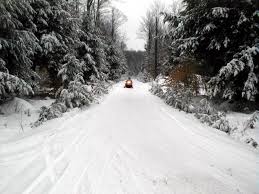Snowdusters optimistic on issue
MANITOULIN—Following a warning from the Ontario Landowners Association (OLA) regarding an omnibus bill making its way through first and second reading in the Ontario legislature, some landowners, including those on Manitoulin, are ending their relationships with clubs like the Manitoulin Snowdusters Snowmobile Club for fear of losing their rights.
Bruce Wood of Green Bay has for many years given land use permission for his Honora Bay property to the Snowdusters for their very busy main trail, C107D. He said he was first alerted to Bill 100, Supporting Ontario’s Trails Act, and Bill 118, the Great Lakes Shoreline Right of Passage Act—the former an omnibus bill—by his sister who saw a letter from the OLA, warning that should these bills pass, it would mean the end of property rights as they understood them.
Mindemoya lawyer Brad Middleton, the spokesman for the Island snowmobile club, told The Expositor that, while he just learned of the proposed legislation, he feels strongly that property owners can enter into contractual agreements with an organization like the Snowdusters that would enable them to opt out of this Act, should it pass.
Bill 100 seeks to: increase awareness about and encourage the use of trails; enhance trails and the trail experience; protect trails for today’s generation and future generations; and recognize the contribution that trails make to quality of life in Ontario. Bill 188 seeks to create a right of passage along the shoreline of any Great Lake between the water’s edge and the high water mark (limited to passage on foot and non-motorized vehicles).
Following this coming weekend’s free snowmobile trail pass weekend in honour of Family Day and the planned Manitoulin Secondary School student snowmobile run, he says he will be closing off his property from the trail system. “And if I shut down the trail, I’m not opening it back up again,” he told The Expositor.
The section of trail that uses Mr. Wood’s piece of property runs across approximately 1,000 acres, he explained. “If this shuts down, I’m not sure how they’re going to run the trail to Little Current,” Mr. Wood said.
Mr. Wood said he fears that, should the omnibus bill pass, groups could come and gain legal access.
Tom Black is the president of the OLA who explained that Bill 118 has passed second reading and is going to committee, likely this month.
“It was brought to our attention by landowners in Lake Erie and Lake Ontario,” the president explained. “In that bill, it includes pretty much every waterway in Ontario—that’s a complete expropriation of every property and part of the wealth that goes with it.”
It was Leeds-Grenville MPP Steve Clark who informed the OLA that it was actually an omnibus bill, including Bill 100, which adjusts numerous other acts “to make it legal,” including the Trespass to Property Act, he said.
Mr. Black further explained that within these changes is the fact that once a landowner grants verbal permission to use one’s property, that permission is written into the deed and will never leave, even upon sale.
“We have nothing against snowmobilers,” Mr. Black said, adding that in fact, he reached out to the Ontario Federation of Snowmobile Clubs (OFSC) president Remi Sauve to help shut down the bill. The response he read in part to this newspaper. It stated that the OFSC did not know about the legislation, but assured the OLA it was not behind it. The OFSC did not offer assistance, however.
“We need the snowmobile guys on board,” Mr. Black said, adding that he believes the bill has likely been prompted by the walking trail groups of the province.
Mr. Black said he has heard of snowmobile trails being shut down in Leeds and Grenville as well as Muskoka as a result of the impending legislation.
“If they pass it, everyone will have to fight it individually in court,” Mr. Black said. “That’s why the OLA is so against it getting through.”
The OLA president said he was sorry for the bad feelings this bill will likely cause around the province. “We have a good working relationship,” Mr. Black said of the OLA and snowmobile clubs.
He said the OLA is not asking landowners to stop allowing trails on their properties, but is rather making them aware of what they believe the bills entail, mainly that a trail will be treatable as a right of way once it is listed on the deed.
“This will be a huge takeaway for property rights,” Mr. Black said.
Mr. Middleton had not heard of either bills until speaking with this reporter. After some preliminary research by Snowdusters secretary Kathy McDonald, Mr. Middleton told The Expositor that “it is Bill 100 which stipulates that the landowner may grant an easement for a specified term. The point is, however, that the landowner has to grant the easement. The recreational club cannot run in and unilaterally register an easement against somebody else’s property, based on previous use or anything else.”
“Bill 118 deals exclusively with Great Lakes shorelines,” Mr. Middleton continued. “It has nothing to do with inland trails, whether they be of a recreational nature or otherwise. More important, it is a private member’s bill which means it has about zero chance of reaching the stage of third reading.”
With only preliminary knowledge of the bills, Mr. Middleton said his first reaction is to disagree with the interpretation being put forward by Mr. Wood and the OLA.
“The proposed legislation would be very draconian if it turns out to be interpreted the way Mr. Wood says it is,” Mr. Middleton added. “I find it very hard to believe that any law or statute could be passed giving a third party the ability to unilaterally claim a right of passage over land based on past use by a recreational club, much less the ability to unilaterally register an easement against title to the property—I doubt that any such statute would stand up to a constitutional challenge.”
If, however, the proposed legislation turns out the way the OLA and Mr. Wood understands it, “it will be disastrous for the snowmobile clubs, the cross-country ski clubs and the hiking trail systems all across the province,” Mr. Middleton continued. “All such recreational organizations depend on the same types of system, with private landowners, namely the granting of permission/consent in return for liability coverage through an insurance policy.”
The Manitoulin Snowdusters monthly meeting will be held tonight, Wednesday, with this topic at the top of their agenda.






